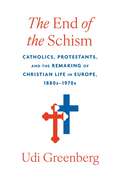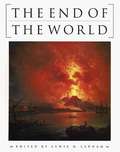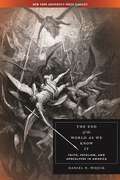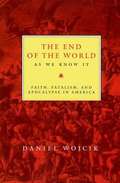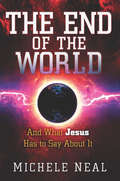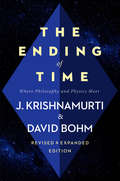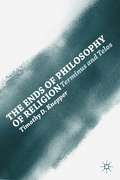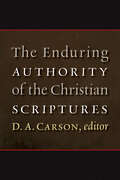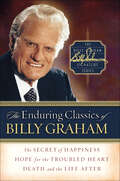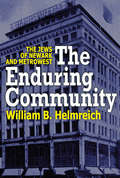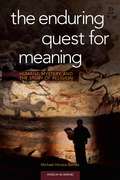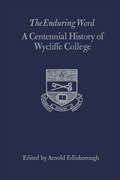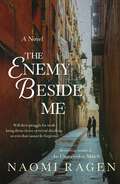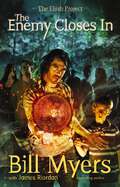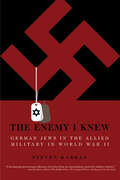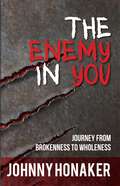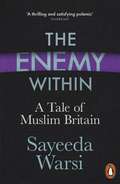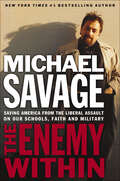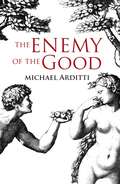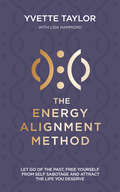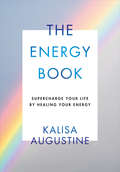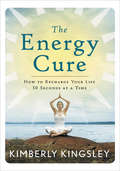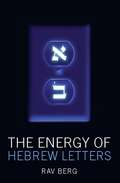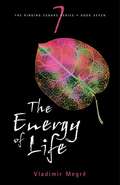- Table View
- List View
The End of the Schism: Catholics, Protestants, and the Remaking of Christian Life in Europe, 1880s–1970s
by Udi GreenbergThe dramatic story behind an extraordinary transformation: the reconciliation between Europe’s Protestants and Catholics, and the emergence of a new era of Christian collaboration.For centuries, Europe’s Catholics and Protestants were bitter rivals, each group blaming the other for violence and alleged moral decline. Yet starting in the 1930s, they swiftly made peace, abandoning old stereotypes and even forming joint political parties and social organizations. Why did these erstwhile adversaries suddenly start cooperating, and what were the consequences?A groundbreaking study, The End of the Schism overturns conventional wisdom about this revolutionary change. Udi Greenberg shows that ecumenism did not grow out of mutual tolerance. Rather, Christian thinkers and politicians on both sides of the Catholic-Protestant divide came together to contain what they considered growing threats to Christian life: socialism, feminism, and Afro-Asian liberation movements. This project of interconfessional peacemaking accelerated with the rise of the Nazis, whose call for religious unity sparked intense debates among Christian denominations about their relationships with one another. Their rapprochement culminated in the unfolding of the Cold War and decolonization, when Catholic and Protestant authorities formally declared each other “brethren in faith.”The End of the Schism makes clear the enormous consequences of the ecumenical revolution. By working together, Catholics and Protestants were able to design Europe’s economic policies, regulate its sexual practices, and deeply shape its postwar relationship with the Global South. As confessional attachments in Europe have weakened, this coalition of Christians has only grown more cohesive, leveraging their alliance to maintain influence across a politically fractured continent.
The End of the World
by Lewis LaphamThe foretelling of the end of the world is as old as the wind in the trees, and against the siege of dire prophecy the reading of history provides a reliable defense. The world as large numbers of people have known it--the Romans at Pompeii in 79 A.D., the Confederate States of America at Richmond in 1865, the Jews in Berlin in 1938--has come to an end many, many times, and writers as unlike one another as Mary Chestnut and Pliny the Younger have had occasion to remark on the spectacle. Usually it turns out that the soothsayers have been misinformed, and what becomes clear in the pages of this book is the striking difference in tone between the voices drumming up the threat of imminent damnation and the voices bearing witness to the event.
The End of the World As We Know It: Faith, Fatalism, and Apocalypse in America
by Daniel N Wojcik&“A marvelous book, at once comprehensive and highly readable, a fascinating analysis of doomsday cults and apocalyptic anxiety.&” —Michael Owen Jones, University of California, Los Angeles From religious tomes to current folk prophesies, recorded history reveals a plethora of narratives predicting or showcasing the end of the world. The incident at Waco, the subway bombing by the Japanese cult Aum Supreme Truth, and the tragedy at Jonestown are just a few examples of such apocalyptic scenarios. And these are not isolated incidents; millions of Americans today believe the end of the world is inevitable, either by a divinely ordained plan, nuclear catastrophe, alien invasion, or gradual environmental decay. Examining the doomsday scenarios and apocalyptic predictions of visionaries, televangelists, survivalists, and various other end-times enthusiasts, as well as popular culture, film, music, fashion, and humor, Daniel Wojcik sheds new light on America's fascination with worldly destruction and transformation. He explores the origins of contemporary apocalyptic beliefs and compares religious and secular apocalyptic speculation, showing us the routes our belief systems have traveled over the centuries to arrive at the dawn of a new millennium. Timely, yet of lasting importance, The End of the World as We Know It is a comprehensive cultural and historical portrait of an age-old phenomenon and a fascinating guide to contemporary apocalyptic fever. &“Fascinating [and] intelligent . . . should be required reading.&” —Psychotronic &“Makes accessible to both scholars and general readers the amazing panorama of millenarian scenarios abounding in America.&” —Robert S. Ellwood, University of Southern California &“The best survey and analysis of the meaning and place of apocalypticism and millennialism in American culture.&” —Religion and Literature
The End of the World As We Know It: Faith, Fatalism, and Apocalypse in America
by Daniel WojcikTimely, yet of lasting importance, The End of the World as We Know It is a comprehensive cultural and historical portrait of an age-old phenomenon and a fascinating guide to contemporary apocalyptic fever.
The End of the World: And What Jesus Has to Say About It
by Michele NealIn her new book about the end times, author Michele Neal highlights many of these prophesied events, and addresses the serious reality that the destiny of half-hearted Christians is in jeopardy. Sound asleep, spiritually, they are neither watching for the Bridegroom nor making themselves ready for His return and risk being caught unprepared. She also reveals from God’s Word the devastating eternal destiny of all who refuse to believe in Jesus, but offers to them the “way of escape.” Let Michele show you what you must do to wake up from this slumber. Don’t gamble with the consequences of sin. The End of the World (And What Jesus Has to Say About It) will help you now to get ready for the future! Time may be short—the Bridegroom will return . . . Are you ready?
The Ending of Time
by Jiddu KrishnamurtiSpirituality meets science as two of the greatest minds of our time come together to discuss essential issues of good and evil, thought and consciousness, and the nature of existence.The Ending of Time presents the fascinating conversations between two men from vastly different worlds: revered philosopher Jiddu Krishnamurti and renowned physicist David Bohm. Through deep exploration of the brain vs. the mind, the significance of death, and an individual's relationship to society, they debate the root of human conflict and what we can do about it. Revolutionary insights throughout these discussions reveal the potential for the ending of time to bring about a new beginning for humanity. wrong turn humanity has taken--a state that they argue can be corrected. Though they insist that mankind can change fundamentally, they warn that transformation requires going from one's narrow and particular interests toward the general, and ultimately moving still deeper into that purity of compassion, love and intelligence that originates beyond thought, time, and even emptiness.This updated edition, edited and revised in clear and engaging language, includes a new introduction and a conversation previously published separately which examines "The Future of Humanity."
The Ends of Philosophy of Religion, Terminus and Telos
by Timothy D. KnepperKnepper criticizes existing efforts in the philosophy of religion for being out of step with, and therefore useless to, the academic study of religion, then forwards a new program for philosophy of religion that is in step with, and therefore useful to, the academic study of religion.
The Enduring Authority of the Christian Scriptures
by D. A. CarsonValuable insights into key disputed topics from a veritable who's who of evangelical scholars In this volume thirty-seven first-rate evangelical scholars present a thorough study of biblical authority and a full range of issues connected to it. Recognizing that Scripture and its authority are now being both challenged and defended with renewed vigor, editor D. A. Carson assigned the topics that these select scholars address in the book. After an introduction by Carson to the many facets of the current discussion, the contributors present robust essays on relevant historical, biblical, theological, philosophical, epistemological, and comparative-religions topics. To conclude, Carson answers a number of frequently asked questions about the nature of Scripture, cross-referencing these FAQs to the preceding chapters. This comprehensive volume by a team of recognized experts will be the go-to reference on the nature and authority of the Bible for years to come. CONTRIBUTORS James Beilby Kirsten Birkett Henri A. G. Blocher Craig L. Blomberg D. A. Carson Graham A. Cole Stephen G. Dempster Daniel M. Doriani Simon Gathercole David Gibson Ida Glaser Paul Helm Charles E. Hill Peter F. Jensen Robert Kolb Anthony N. S. Lane Te-Li Lau Richard Lints V. Philips Long Thomas H. McCall Douglas J. Moo Andrew David Naselli Harold Netland Osvaldo Padilla Michael C. Rea Bradley N. Seeman Alex G. Smith R. Scott Smith Rodney L. Stiling Glenn S. Sunshine Timothy C. Tennent Mark D. Thompson Kevin J. Vanhoozer Bruce K. Waltke Barry G. Webb Peter J. Williams John D. Woodbridge
The Enduring Classics of Billy Graham (Billy Graham Signature Series)
by Billy GrahamThree authoritative Christian classics in one volume by the beloved evangelist who inspired billions—from everyday people to presidents.This first volume of The Billy Graham Signature Series includes three of the world-renowned minister’s greatest works:The Secret of Happiness teaches that happiness is a by-product—a bonus that comes when we seek what is really important.Death and the Life After liberates readers from fear and denial on the topic of death and helps them find peace, assurance, and ultimately triumph.Hope for the Troubled Heart teaches about God’s unfailing love as the key to hope in the midst of difficult circumstances.Billy Graham’s reputation as the world’s leading teacher of biblical truths makes this collection ideal for anyone searching for answers to some of life’s most troubling questions. As these powerful inspirational writings remind us, no one communicates with the wisdom and simplicity of Dr. Graham.
The Enduring Community: The Jews of Newark and MetroWest
by William B. HelmreichFrom its founding in the late seventeenth century, Newark, New Jersey, was a vibrant and representative center of Jewish life in America. Geographically and culturally situated between New York City and its outlying suburbs, Newark afforded Jewish residents the advantages of a close-knit community along with the cultural abundance and social dynamism of urban life. In Newark, all of the representative stages of modern Jewish experience were enacted, from immigration and acculturation to upward mobility and community building. The Enduring Community is a lively and evocative social history of the Jewish presence in Newark as well as an examination of what Newark tells us about social assimilation, conflict and change.Grounded in documentary research, the volume makes extensive use of interviews and oral histories. The author traces the growth of the Jewish population in the pre-Revolutionary period to its settlement of German Jews in the 1840s and Eastern European Jews in the 1880s. Helmreich delineates areas of contention and cooperation between these groups and relates how an American identity was eventually forged within the larger ethnic mix of the city. Jewish population in politics, the establishment of Jewish schools, synagogues, labor unions, charities, and community groups are described together with cultural and recreational life. Despite the formal and emotional bonds that formed over a century, Jewish neighborhoods in Newark did not survive the postwar era. The trek to the suburbs, the erosion of Newark's tax base, and deteriorating services accelerated a movement outward that mirrored the demographic patterns of cities across America. By the time of the Newark riots in 1967, the Jewish presence was largely absent.This volume reclaims a lost history and gives personalized voice to the dreams, aspirations, and memories of a dispersed community. It demonstrates how former Newarkers built new Jewish communities in the surrounding suburbs, an area dubbed "MetroWest" by Jewish leaders. The Enduring Community is must reading for students of Jewish social history, sociologists, urban studies specialists, and readers interested in the history of New Jersey. The book includes archival photographs form the periods discussed.
The Enduring Quest for Meaning: Humans, Mystery, and the Story of Religion
by Michael Horace BarnesHuman beings are uniquely equipped with a capacity and curiosity to consider mystery. Four countless generations, people have asked and answered existentially urgent and provocative questions: What is the meaning of life? Is there some ultimate being at work in the universe, or is the world as we experience it entirely arbitrary? What does it mean to be a good person, and how do we do it? Religions of the world have traditionally been an outlet for dealing with mystery, though at different times and in different places, people have responded to these time-honored questions with various stories, myths, rituals, symbols, and even scientific exploration. In this book, Michael Horace Barnes presents a chronicle of the human quest to make sense of these mysteries through religious traditions. Tracing this quest from the mythic tales of hunter-gatherers to modern scientific atheism, this text sheds light not only on the mysteries people face, but also--more importantly--on the people who face them. With charts, pictures, and discussion questions at the conclusion of each chapter, the book makes questions of ultimate meaning accessible and engaging for any audience.
The Enduring Word: A Centennial History of Wycliffe College
by Arnold EdinboroughSince Wycliffe College was founded 100 years ago as an Anglican theological college in Toronto, it has had six principals. To celebrate the influence they and the college have had on the religious life of Canada and other countries, six writers have collaborated to produce The Enduring Word. The lives of the five past principals have been written by Jacob Jocz, T.R. Millman, R.K. Harrison, Alan Hayes, and Robert Finch. Arnold Edinborough's profile of the present principal, Dr Reginald Stackhouse provides insight into both the man and the kinds of challenges he faces as he leads Wycliffe into its second century. Rich in anecdote and sound in research, The Enduring Word is a centennial volume whose interest goes far beyond the college and its members pas and present.
The Enemy Beside Me: A Novel
by Naomi RagenInspired by true events, Naomi Ragen's The Enemy Beside Me is a powerful, provocative novel about two people fighting for reconciliation over unforgivable crimes of the past.Taking over from her father and grandfather as the head of the Survivor’s Campaign, an organization whose purpose is to bring Nazi war criminals to justice, Milia Gottstein has dedicated her life to making sure the voices of Holocaust victims will never be silenced. It is an overwhelming and heartbreaking mission that has often usurped her time and energy being a wife to busy surgeon Julius, and a mother and grandmother. But now, just as she is finally ready to pass on her work to others, making time for her personal life, an unexpected phone call suddenly explodes all she thought she knew about her present and her future.In the midst of this personal turmoil, Milia receives an invitation to be the keynote speaker at a Holocaust conference in Lithuania from Dr. Darius Vidas, the free spirited, rebellious conference head. Despite suspecting his motives—she is, after all, viewed as a ‘public enemy’ in that country for her efforts to have them try war criminals and admit their historic responsibility for annihilating almost their entire Jewish community, including her own family—she nevertheless accepts, having developed a secret agenda of her own. But as Milia and Darius begin their mission, shared experiences profoundly alter their relationship, replacing antagonism and suspicion with a growing intimacy. However, this only ramps up the hostile forces facing them, threatening their families, livelihoods, and reputations, and forcing them into shocking choices that will betray all they have achieved and all that has grown between them.
The Enemy Closes In (The Elijah Project)
by Bill Myers James RiordanIn book two, The Enemy Closes In, Zach meets a runaway who dabbles with the supernatural, and Elijah comes to their aid while another evil force closes in—the foul Shadow Man. But Shadow Man is no match for heavenly forces watching over them.
The Enemy I Knew: German Jews in the Allied Military in World War II
by Steven KarrasJewish refugees who fled the Nazis—then returned to fight them as Allied soldiers—share their experiences: “Heroic, poignant [and] compelling.” —The Daily NewsEven Holocaust survivor Elie Wiesel struggled with the question: Why didn’t the Jews fight back? But he finally concluded that the real question was how so many of them did. As he put it, “Tormented, beaten, starved, where did they find the strength—spiritual and physical—to resist?” In fact, over 10,000 German Jews fought in the Allied armies of World War II. This book honors those European-born combat veterans—refugees from the Nazi regime in Germany and Austria who faced their persecutors by joining the Allied forces in a fight against the country of their birth. These twenty-seven interviews take us into the unique and harrowing experiences of brave men—and one brave woman—whose service restored a sense of dignity and allowed them to rise above their former victimization. All burned with anger at the Germans who’d subjected them, often as young children, to cruelty in everyday life in their hometowns, and to ridicule in the national media. As soldiers who knew the language and psychology of the enemy better than any of their comrades, they struck back with newfound pride against the rampant injustice that had annihilated their families, destroyed their prospects, and subjected many of them to the worst forms of physical abuse, both random and terrifying. In The Enemy I Knew they tell their stories—and the world is richer for their heroic acts, and for their testimony.“It is rare to come across a book about a forgotten story from World War II, but Steve Karras has found one of the most compelling, little-known accounts from the war and he tells it brilliantly. Harrowing, breathtaking in parts, and completely absorbing.” —Andrew Carroll, New York Times–bestselling editor of War Letters“Few stories can rival the ones told in The Enemy I Knew.” —Library Journal (starred review)
The Enemy In You: Journey From Brokenness to Wholeness
by Johnny HonakerYou have been through the storms of life and have achieved victory, but an empty feeling lingers. It could be you have to recover what Satan has plundered from you. In The Enemy in You, Pastor Johnny Honaker takes you on a journey from brokenness to wholeness. As God brings healing, you will ascend from the ashes and ruins of pain and calamity to achieve your personal destiny. THIS BOOK EQUIPS YOU TO:• Recover your identity in Christ from the clutches of the enemy • Understand the source of pain and overcome it • Demolish the invisible walls that keep you emotionally chained Ask the HOLY SPIRIT to identify and confront the brokenness in your life, and walk out of hardship with your hands full of God&’s blessings.
The Enemy Within: A Tale of Muslim Britain
by Sayeeda Warsi'Hard headed, well informed and intellectually coherent ... it turns conventional wisdom on its head. It deserves to promote a public debate on this subject which has been needed for more than 20 years' Peter OborneBritain has often found groups within its borders whom it does not trust, whom it feels have a belief, culture, practice or agenda which runs contrary to those of the majority. From Catholics to Jews, miners to trade unionists , Marxists to liberals and even homosexuals, all have at times been viewed, described and treated as 'the enemy within'. Muslims are the latest in a long line of 'others' to be given this label. How did this state of affairs come to pass? What are the lessons and challenges for the future - and how will the tale of Muslim Britain develop? Sayeeda Warsi draws on her own unique position in British life, as the child of Pakistani immigrants, an outsider, who became an insider, the UK's first Muslim Cabinet minister, to explore questions of cultural difference, terrorism, surveillance, social justice, religious freedom, integration and the meaning of 'British values'.Uncompromising and outspoken, filled with arguments, real-life experience, necessary truths and possible ways forward for Muslims, politicians and the rest of us, this is a timely and urgent book.'This thoughtful and passionate book offers hope amid the gloom' David Anderson QC, Independent Reviewer of Terrorism Legislation'A vital book at a critical time' Helena Kennedy QC
The Enemy Within: Saving America from the Liberal Assault on Our Schools, Faith and Military
by Michael SavageAmerica's bravest, brashest voice is back?as ferocious and cutting as ever."Where has six decades of radical, mad-dog liberalism brought us?" Savage asks in his electrifying new book. "I'll tell you where: America is teetering on the cliffs of insanity."Written with the fire, the conviction, and the clear vision of a modern-day prophet, Savage returns with a vengeance in this lightning rod of a book, speaking for all Americans who are fed up and ticked off at the corrosive influence of today's "psycho liberals"?the Democrats, as he calls them."They're speeding down the pathway of good intentions. Their mantra: Celebrate perversity, embrace ultra-tolerance, pay rape-a-nations (so-called reparations), support affirmative racism, and provide government subsidies for every illegal who sneaks across the border. In their haste to push failed socialist ideals, the libs have placed us on a crash course of total destruction."Even while the heated controversy of his New York Times bestseller, The Savage Nation, still simmers, Michael Savage raises his weapons of matchless wit and moxie again, this time aiming his sights on the liberal assault on our most cherished institutions and taking a stand for our schools, our faith, our police and armed forces, and, most important, our families.It isn't always pretty. You might even at times become uncomfortable. But as you read on, you'll find these pages always contain the Savage truth. That is how to fight the Enemy Within.Filled with riotous rage and blistering humor, this book inspires as it enflames, encouraging Americans to reclaim our country, our government, our national integrity.
The Enemy of the Good
by Michael ArdittiOver three remarkable years, the Glanvile family go through events and ordeals that cause it to reassess its deepest values and closest relationships'Our best chronicler of the rewards and pitfalls of present day faith' Philip Pullman'His best to date . . . You could truly say all human life was here' A.N. Wilson, Reader's DigestThe Glanvilles are an extraordinary family. Edwin is a retired bishop who has lost his faith. Marta, a child of the Warsaw Ghetto, is a controversial anthropologist. Their son, Clement, is a celebrated gay painter traumatized by the death of his twin. Their daughter, Susannah, is a music publicist recovering from an affair with a convicted murderer. Over three remarkable years, the family goes through a sequence of events that causes it to reassess its deepest values and closest relationships. Clement's work and reputation are violently attacked and his private life exposed. Susannah's exploration of the Kabbalah takes her into the closed world of Chassidic Jews and a seemingly impossible love. Edwin's illness forces Marta to confront the horrors of her past. Each must find a way to escape the abyss.
The Energy Alignment Method: Let Go of the Past, Free Yourself From Sabotage and Attract the Life You Want
by Lisa Hammond Yvette TaylorDo you want to be happy, more in flow, and change your life? The Energy Alignment Method – EAM®, is a transformational energy and self-help process. The technique brings together Chinese medicine, manifesting, law of attraction, elements of kinesiology, neuroscience research, NLP, positive psychology and eastern spiritual principles into one powerful self-help process. EAM® enables you to release repetitive negative thoughts and feelings, painful memories, traumatic experiences and overwhelming emotions, so that you can be free from stress, anxiety and negative emotions. The technique involves 5 simple steps, and can be used all day every day. A key part of the practice is known as ‘the sway’, a muscle testing method taken from Applied Kinesiology. It provides realtime energetic feedback. This book explains what EAM is and how it works, then shows readers how to use it themselves.
The Energy Book: Supercharge your life by healing your energy
by Kalisa AugustineYou are your own healer. Discover how with this book.We are in 'The Age of Energy' Gwyneth Paltrow'A must read for all healers and those seeking healing.' David Grand, PhD (Developer of Brainspotting)Your energy is your essence. It's your personal power source. It influences the life choices you make. If your energy is blocked, you can feel unwell and you can get stuck in negative routines. This down-to-earth, comprehensive guide to the ancient and modern traditions of energy healing will enable you to tune in to your energy and awaken your power. Explore ancient and modern healing techniques - from reiki to sound healing, crystal healing to shamanic healing, meditation to breathwork. Use your energy to live more positively, to manifest your goals, to stay grounded, and to find greater calm and happiness.
The Energy Cure: How to Recharge Your Life 30 Seconds at a Time
by Kimberly Kingsley&“It dances you through many quick and easy energy-boosting tips but by the end you&’ve also taken a spiritual journey that leaves you at peace.&”—Steve Chandler, author of Creator If the terms &“spread too thin,&” &“drained,&” and &“strung out&” sound familiar, it is because they accurately describe the chronic energy deficiency that many people experience today. The demands of a fast-paced world often pull our energy in multiple directions, leaving us depleted and overwhelmed. Gulping down Red Bull or relying on adrenalin for energy is not a long-term solution but is being treated as such, thus causing many stress-related illnesses. In this timely book, psychotherapist and energy coach Kimberly Kingsley introduces personal energy management—a way to live life to its fullest while preserving and renewing your most precious resource. Learning to harness and manage your personal energy can elevate you from survival mode to a place where you grow and thrive. As a guide to personal energy management, this book teaches you to: increase resilience against daily challenges by cultivating an energy buffer; use the language of energy for making everyday decisions; protect yourself from &“drains&” that exist in every sphere of life; and become free from self-defeating thoughts and behaviors that deplete energy. With The Energy Cure, you&’ll see how to make life-enhancing choices, not life-depleting ones, every moment of every day. &“The Energy Cure is an affirmation that it is possible to unplug from external chaos and connect to internal peace.&”—Foreword
The Energy of Hebrew Letters
by Rav P.S. BergAccording to the Zohar, among God's first creations were the 22 letters of the Hebrew alphabet. Kabbalah teaches that the alphabet, called "ivrit" in Hebrew, comes from the root word lavir, or to transfer. Far more than simple symbols of communication, the letters transfer energy from the Light of God into the physical world. The story of the letters as they pleaded their respective cases for the primary role in God's creative process is the blueprint by which Creation was made possible. In his new book, Rav Berg reveals the spiritual meaning and history of each of the 22 letters: how and why each was created, and what energy it transmits. Berg uses quantum physics to illustrate this bedrock of Kabbalah, proving that this truly is a time when physicists and metaphysicists are joining hands and minds.
The Energy of Life (The Ringing Cedars Series #7)
by Vladimir Megré John Woodsworth Leonid SharashkinMan's life! On what or on whom does it depend? Why do some become emperors or regimental commanders, while others are obliged to fend for scraps at garbage dumps? One opinion holds that each person's fate is pre-determined from birth. That would make Man nothing more than an insignificant cog in some mechanised system, and not the highly organised creation of God.
